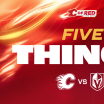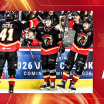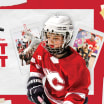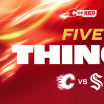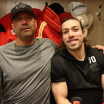Harnarayan Singh's story is inspirational.
The Flames.com contributor - who hosts Flames TV Punjabi - has a new book out: One Game At A Time.
CBC aptly summed up his tale, saying: 'Growing up in small-town Alberta, Harnarayan was like many other kids who dreamed about a life within the sanctum of the game they idolized. There was only one small difference - he didn't look like any of the other kids. And when he sat down on Saturday nights to tune in to Hockey Night in Canada with the rest of the nation, he couldn't ignore the fact that the broadcasters or analysts didn't look like him either. Undeterred, Harnarayan worked his way from calling imaginary hockey games with his plastic toy microphone as a child, to funding secret flights from Calgary to Toronto every weekend in the early days of Hockey Night in Punjabi, to making history as the first Sikh to broadcast an NHL game in English.'
Flames.com's Ty Pilson sat down with Singh for a Q&A about this remarkable read.
Q&A WITH HARNARAYAN SINGH
Broadcaster and Flames TV contributor talks about his new book and his incredible journey in the hockey world
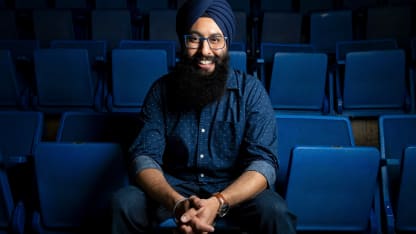
Q: What made you decide now was the time to write this book? Your story certainly isn't over. Why now?
A:I actually didn't think I would ever be writing a book at this point in my life, but the publishers approached me and their wavelength was similar to the wavelength I'm on when I go to talk to students at high schools. My messaging to them is a story of inspiration and that's how they were looking at it. So, we kind of had the same mindset about it, and you know, what's interesting is the book has become even more timely that it was when we started out a few years back because the subject of the book, it touches on so many of the things we're seeing nowadays. … I would say it's a hockey story, but it's not just for people in the hockey world because it's a necessary, positive message about diversity through the lens of a sports broadcaster. It really shows the power sports has to unite and I think it just also really shows the power of hockey in Canada, especially given just what the sport can do for a person like myself who was in that situation, being in a small town, being a visible minority.
Q: One thing I found fascinating about the book is it's very much your story, very much about the individual journey you've been on, but a lot of the themes in the book are universal, whether it's trying to fit in school, balancing a home life and work life, the relationship with your wife and how you met her, fighting for the career you're passionate about but wondering if you'll be successful. This book can really speak to people because I think folks can see themselves in many of those situations?
A:That's actually something I didn't realize until after I was done writing it. The editor from the publishing company, his name is Joe Lee, he's Korean, and we did a Q&A with the publishers and a lot of people that work there and he was talking about my book, sitting beside me in front of this group of people, and, you know, he got emotional, and for me that really hit home because he was saying how many parallels there were to his own personal journey. He grew up in Oshawa, Ontario, and his parents weren't skaters, weren't into hockey, either, but he was into it and that's what really helped him as a kid growing up, too. And just since the book has come out, there's been so many messages from people who, from all over Canada - especially the small-town folks, people of colour, who experienced traumatic racist moments - it was also hockey that was always there for them.
!
Q: One big focus of the book was that perseverance angle. What you went through in terms of having a dream, a very difficult dream, and not giving up on it?
A: I never had to think about it in that sense until writing the book. I never realized, either, that as much as there was perseverance and having an eye on the goal, there was a lot of doubt to deal with, too, along the way. And I think part of that, what I'm realizing now, is what it puts into your psyche when you've been told so many times that this dream is probably impossible - it's such a long shot for it to come true. And so that plays a role, too, but I think that, you know, up until Hockey Night in Punjabi started, the doubt was big. I didn't go into the industry to be a CBC radio reporter so during the time up until Hockey Night In Punjabi, I was still trying to figure out, 'OK, is this industry really for me?' I wanted to do sports, specifically hockey, and I hadn't found a way yet. I mean, it's still early on in my career and I had done the TSN angle but really when Hockey Night In Punjabi began, that's when this almost attitude of defiance, in that sense that I'm going to do whatever it takes to keep this alive and make this long term, that's when that began. And that's when I made the decision to pay for my own flights and do all that with perseverance. I mean, my foot's in the door, actually here I am now, a part of this, and now it's like no matter what happens I have to figure out a way to make this continue and so that's the turning point.
Q:Do you hope this book serves as a motivation for people, that no matter who they are or what they are trying to accomplish, that it can be possible. Dream big, so to speak?
A:I definitely hope it provides inspiration and motivation for people out there. And, you know, I'm seeing that now from the comments from people that have read it, even early on. And that's amazing to get that feedback. I really think that you hit the nail on the head there. If you have a goal and a dream, we are so blessed to be a country where it doesn't matter who you are, you can really pursue it and have a shot at it. But in saying that, ya, you're going to have to put your be-all, end-all into it. It's not necessarily going to be an easy path and my story proves that. That's my message to a lot of younger people out there: If I can make it, you can definitely make it but you're going to have to put in the work.
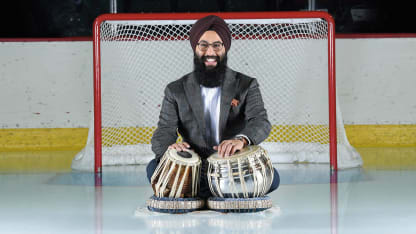
Q:Do you still have the pinch-me moments when you look at far you've come and how much you've accomplished?
A: I had that moment when we finished the first manuscript for the book and then I had to go back and read it and it was like, 'did all this happen to one person?' And I'm sitting here, mid-'30s, and it's pretty incredible. I had a chance to write for the Players' Tribune, too, and I remember when I was working with them, they told me I had enough for a book and I didn't think so. You don't think that's even a possibility and then later on, fast forward a couple of years, and the publishers are calling you about it. There's definitely still pinch-me moments now.

Q: To me, after reading your book, I kind of broke it down into three parts: it was a love letter to the game, it's a love letter to your culture, and it's a love letter to your family. Those are three really distinct parts to me when I read through it. What do you think?
A: I would say that's a really interesting perspective. It's interesting, just watching the Stanley Cup being won now and the players, after winning, they talk about thanking everybody who has gotten them to where they are up until that point. And, for me, the book was a lot of different things, a lot of different emotions. It was to say thanks to the hockey world, and to my family, you're right.




